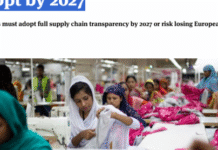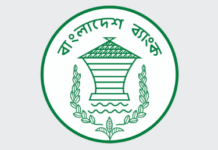NGOs allowed to charge up to 9pc interest
New Age | Apr 20,2020

A file photo shows a farmer carrying a stack of harvested paddy on the outskirts of Dhaka. The Bangladesh Bank on Monday launched a Tk 3,000 crore revolving refinance scheme for low-income group people, farmers and marginal or small businesses, specifying that loans from the scheme would be disbursed through the microcredit entities, also known as non-governmental organisations. — New Age photo
The Bangladesh Bank on Monday launched a Tk 3,000 crore revolving refinance scheme for low-income group people, farmers and marginal or small businesses, specifying that loans from the scheme would be disbursed through the microcredit entities, also known as non-governmental organisations.
With a grace period of three months, the highest ceiling on interest rate for borrowers was set at 9 per cent, said the Bangladesh Bank guidelines issued on the day.
An official of the central bank said that the loans would not be disbursed through the banks or non-bank financial institutions.
He mentioned that the interest rate ceiling set in the BB’s guidelines was much lower than the interest rate the microcredit entities or NGOs usually charged the borrowers.
The microcredit firms or NGOs usually charge the borrowers up to 24 per cent.
As the banks usually do not have the capacity to reach to the villagers, the BB launched the fund in addition to the existing Tk 5,000 crore scheme, which would be disbursed through the banking channel at the rate of 4 per cent interest, to reach to the people in the remote areas, the BB official said.
As per the guidelines, the central bank would disburse fund to the banks at 1 per cent interest.
Afterwards, the banks charge the microcredit entities or NGOs up to 3.5 per cent interest.
The NGOs have been asked to apply discounted interest rate on the borrowers, the circular said.
Except the admission fee, passbook, loan form and non-judicial charges, the NGOs would not be allowed to impose any other charges on the borrowers.
The microcredit entities or NGOs are allowed to collect loan instalments on weekly or monthly basis after the three-month grace period while the NGOs will have to repay the banks on quarterly basis instalment.
Simultaneous, the banks will have to repay the central bank on quarterly basis.
The responsibility of the loan recovery would be on the NGOs and on the banks, the BB guidelines said.
Low-income group people, farmers and marginal or micro businesses would get loans for income-driven purposes.
For a single person, the borrowing limit from NGOs has been set at Tk 75,000 and the limit would be Tk 3 lakh for a group of at least 5 individuals.
NGOs’ lending limit to a single small entrepreneur has been set at Tk 10 lakh while the limit would be Tk 30 lakh for a joint project of a group of at least 5 members.
The borrowing capacity would increase proportionately with the increase of number of members in any group.









